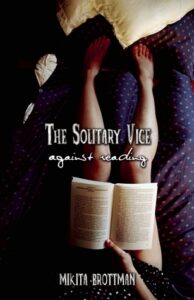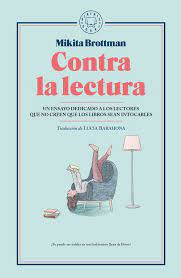 A Publisher’s Weekly Best Book of 2008
A Publisher’s Weekly Best Book of 2008
“Mikita Brottman is one of us: another victim of the unhealthiest and most solipsistic of media pleasures. In this compelling condemnation of literature, she nonetheless offers us one more reason to pick up a good book–her own.” — Douglas Rushkoff, author of Present Shock: When Everything Happens Now

Spanish edition, trans. Lucía Barahona, Blackie Books, 2014
In The Solitary Vice: Against Reading (Counterpoint, 2008), Mikita Brottman wonders, just why is reading so great? It’s a solitary practice, one that takes away from time that could be spent developing important social networking Sskills. Reading’s not required for health, happiness, or a loving family. And, if reading is so important, why are catchy slogans like “Reading Changes Lives” and “Champions Read” needed to hammer the point home? Fearlessly tackling the notion that nonreaders are doomed to lives of despair and mental decay, Brottman makes the case that the value of reading lies not in its ability to ward off Alzheimer’s or that it’s a pleasant hobby. Rather, she argues that like that other well-known, solitary vice, masturbation, reading is ultimately not an act of pleasure but a tool for self-exploration, one that allows people to see the world through the eyes of others and lets them travel deep into the darkness of the human condition.
“Author and Maryland Institute College of Art professor Brottman (High Theory/Low Culture) challenges the conventional wisdom of her fellow compulsive readers, positing that “while illiteracy is just as dangerous as sexual ignorance, in both cases there’s a case to be made for moderation.” As the title entendre suggests, Brottman is an advocate of reading for pleasure, but she draws witty and serious ties between literacy and a number of impulses, compulsions and neuroses: voyeurism, celebrity worship, guilt, isolation and “Severe Disappointment with Reality.” With thoughtful deference to those “smart, well-educated people… for whom reading is anything but ‘fun-damental,’” she cites recent titles challenging the reading-is-good-for-you “superstition” (How to Talk About Books you Haven’t Read, Everything Bad is Good for You), mines her own past for tales of reading excess (“I became something of a ghoul myself, buried all day in my bedroom… except to renew my library books”) and looks hard at “some of the things literature… can’t do.” Brottman beats a winding path through library stacks, “ought” books and the virtues of true crime. Of course she rallies for the home team, locating reading’s greatest virtue in its faculty for individual self-discovery (not unlike masturbation). With sharp observations, a brisk style and a wide range of topics, Brottman’s is a rare feat: a crowd-pleaser that could make converts out of readers and nonreaders alike.”– Publisher’s Weekly
“Brottman boldly challenges the current conventional wisdom, expressed in such venues as citywide reading campaigns and the NEA’s Reading at Risk report, that reading is an unalloyed good…Citing her own childhood reading obsession, devouring horror stories ‘locked away in my attic bedroom . . . avoiding everything I could, except books,’ she describes how reading turned her ‘from an ordinary, introspective teenager into a barely functional recluse.’… Yet, as Brottman generously shares her own reading obsessions, she subtly challenges us to consider what gives each of us who love to read our unique passion for the written word.” — Harvey Freedenberg, Shelf Awareness
“The Solitary Vice will make you rethink your own relation to reading. Brottman is wonderful at reminding us what a very complicated act–of fantasy, recompense, adventurism and (sometimes) perversity–reading a book can be.” — Laura Kipnis, author of Against Love
“Her book is part provocation, part memoir and part memorable roadmap to some of literature’s best.” — Geeta Sharma-Jensen, Milwaukee Journal Sentinal
“Here’s a book, from a professor no less, that asks the heretical question: Is reading as great as all those preachy public service campaigns would have us believe? …But as Mikita Brottman, who teaches literature and college at the Maryland Institute College of Art, acknowledges, she’s not against reading. She’s for thinking about reading in more complex ways:’It’s easy to get into the habit of reading; what’s much more difficult is learning to become a conscientious, discerning reader.’ The Solitary Vice will help.” — USA Today
